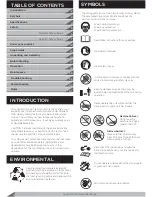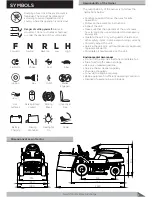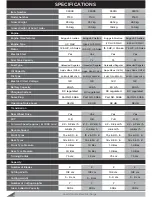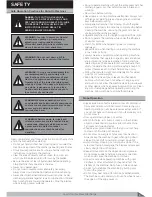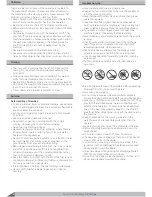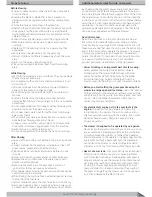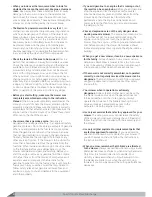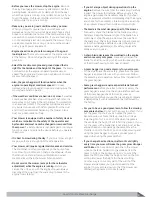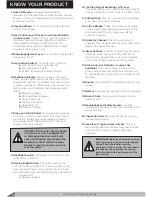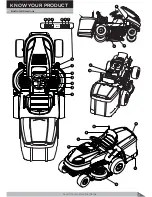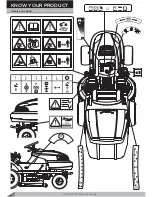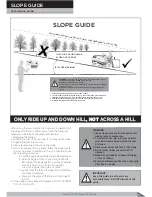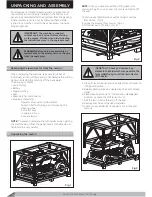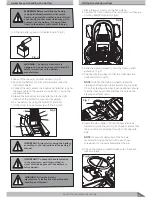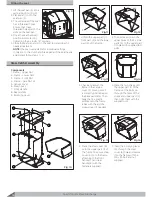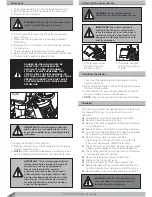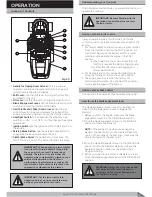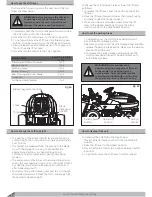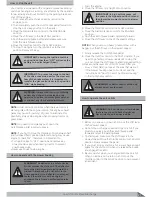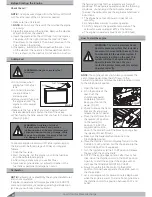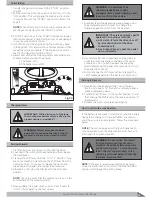
•
When you look over the lawn, remember to look for
obstacles that cannot be removed, like pipes, stumps or
rocks.
Keep away from these obstacles that can cause
damage to the mower or injury to the operator or a
person near the mower. Clear the area of rocks, toys,
wire or other loose objects. These items can damage the
mower or can be discharged by the mower blade.
•
The blade of a power mower rotates very fast.
It can
discharge rocks and other objects over a long distance
which can be dangerous. The force of the objects can
break windows, cause injuries or even put an eye out.
Most of the time the injury is to a person, like a child.
Keep every person completely away from the area to
be mowed. Make sure the grass is not discharged
toward anyone. Planning your mowing pattern has a
double advantage. It can decrease the possibility of an
injury and make the clean up after mowing easier.
•
Check the terrain of the area to be mowed.
Mow in a
pattern that will keep you away from dangerous areas.
Check the distance you need to stop and the distance
available to turn. Slopes and rough terrain must be
mowed carefully and some areas must not be mowed
at all. With riding mowers, mow up and down the hill.
When you must mow rough terrain or on slopes, never
change directions or change gears and stop in these
areas only in an emergency. Before you ride up or down
a slope, try to back straight up the slope. Do not ride up
or down a slope that is too steep to back straight up.
Refer to page 13 of this manual to check any slopes.
•
Before you start cutting, make sure the mower was
completely assembled according to the Instruction
Manual.
If the mower was completely assembled at the
store, you must still check the mower according to the
assembly instructions. Make sure the mower is correctly
assembled and that all fasteners are tight. Make sure the
engine has the correct amount of oil. Check these items
often during the life of the mower.
•
Your mower has a gasoline engine.
Gasoline is a
dangerous fuel. Keep gasoline only in an approved safety
gasoline container. Do not keep large amounts of gasoline.
When you add gasoline to the fuel tank, do not smoke.
Store the gasoline container and the mower in an area
that has good ventilation. Also, keep the gasoline away
IURPDQ\µDPHVOLNHWKHSLORWOLJKWRIDIXUQDFHRUDQ\
other source of ignition. If the mower is to be stored for
more than a few weeks, remove the gasoline from the
fuel tank. When inside an enclosure, do not add gasoline
to the fuel tank. Before you add gasoline, move the
mower outside and add gasoline carefully. Before you
start the engine, remove any gasoline from the outside
of the fuel tank or from the mower. Warm gasoline will
expand. Leave some space in the fuel tank for the
gasoline to expand. Also, the fuel cap has a vent hole for
fuel vapors. Always use the correct fuel cap. Failure to
IROORZVDIHW\UXOHVDERXWJDVROLQHZLOOFDXVH´UHVDQG
explosions, injury to you and damage to the equipment
and other property.
•
If you add gasoline to an engine that is running or hot,
the result can be an explosion.
Before you add gasoline,
stop the engine and let the engine cool for several
minutes. Remove dry grass and other debris from the
mower. Keep the mower clean to improve the
performance, help the engine and transmission run
cooler, extend the life of moving parts, and decrease
WKHGDQJHURID´UH
•
Fires and explosions are not the only dangers when
working around a mower.
The engine, transmission, and
WKHPXIµHUZLOOJHWKRWLQVHYHUDOPLQXWHVZKHQWKH
engine is running. Do not touch these parts of the
mower. Stop the engine. Let the engine and transmission
cool before servicing the mower. Remember, exhaust
fumes are dangerous. Never operate the engine inside a
building.
•
When you get a new mower, it can be a new experience
for the family.
Tell each person how a mower can be
dangerous. Remember, a mower is not a toy. A mower
is not to be used by children or anyone not old enough,
strong enough or that does not have experience.
•
If the mower is not correctly assembled, not operated
correctly, or not regularly serviced, the mower can be
dangerous.
The most important rule to follow is always
use good judgment and common sense. Mow safely
and carefully.
•
Your mower when in operation is extremely
dangerous.
Fingers, feet and other parts can be cut by
the blade. Injuries occur when the operator does not
think and reaches into the chute opening. Always
operate the mower as if the blade is rotating. Do not
service or make an adjustment, except to the
carburetor, while the engine is running.
•
Use only accessories that are factory approved for your
mower.
The wrong accessory can decrease the safety
of the mower and can even damage the unit. Read and
follow the instructions included with the accessory and
the mower.
•
Use only original equipment or replacement parts that
are factory approved for service.
If you need service,
select an Authorized Service Center for your mower. If
you do the work on the unit, follow the instructions in
the Instruction Manual.
•
When you mow, remember that children are attracted
to the mower.
Always use caution when mowing around
obstacles like trees or shrubs or when moving backward.
Only mow in a forward direction if possible. Your
visibility is decreased when you mow backward. Also,
the blades are made to cut while the unit is moving
forward. If you mow backward, the cutting performance
decreases.
Lawn Tractor Rear Discharge
8
Summary of Contents for Gizmow T130
Page 12: ...KNOW YOUR PRODUCT Lawn Tractor Rear Discharge 12 Decals and Labels ...
Page 37: ...PARTS SCHEDULE Lawn Tractor Rear Discharge 37 T130 T140 T160 T180 Lawn Tractor Rear Discharge ...
Page 38: ...PARTS SCHEDULE Lawn Tractor Rear Discharge 38 ...
Page 40: ...Lawn Tractor Rear Discharge 40 PARTS SCHEDULE T130 T160 T140 T180 LAWN TRACTOR 1A ...
Page 44: ...T130 T160 T140 T180 LAWN TRACTOR 1B PARTS SCHEDULE Lawn Tractor Rear Discharge 44 ...
Page 49: ...T130 T160 LAWN TRACTOR 1C Lawn Tractor Rear Discharge 49 PARTS SCHEDULE ...
Page 50: ...T140 T180 LAWN TRACTOR 1C PARTS SCHEDULE Lawn Tractor Rear Discharge 50 ...
Page 53: ...T130 T160 T140 T180 LAWN TRACTOR 1D Lawn Tractor Rear Discharge 53 PARTS SCHEDULE ...
Page 56: ...T130 T160 T140 T180 CUTTING DECK 2 PARTS SCHEDULE Lawn Tractor Rear Discharge 56 ...
Page 60: ...T130 T160 FRONT AXLE 7 PARTS SCHEDULE Lawn Tractor Rear Discharge 60 ...
Page 61: ...T140 T180 FRONT AXLE 7 Lawn Tractor Rear Discharge 61 PARTS SCHEDULE ...
Page 63: ...T130 T160 T140 T180 LIFTING LEVER 11 Lawn Tractor Rear Discharge 63 PARTS SCHEDULE ...
Page 65: ...T130 T160 T140 T180 HUB 14 Lawn Tractor Rear Discharge 65 PARTS SCHEDULE ...
Page 67: ...T130 T160 T140 T180 REAR AXLE 15A Lawn Tractor Rear Discharge 67 PARTS SCHEDULE ...
Page 69: ...T130 T160 T140 T180 REAR AXLE 15B Lawn Tractor Rear Discharge 69 PARTS SCHEDULE ...
Page 73: ...T130 T160 T140 T180 HOOD 24 Lawn Tractor Rear Discharge 73 PARTS SCHEDULE ...
Page 75: ...T130 T160 T140 T180 PANEL 25 Lawn Tractor Rear Discharge 75 PARTS SCHEDULE ...
Page 77: ...T130 T160 T140 T180 ELECTRICAL SYSTEM 27 Lawn Tractor Rear Discharge 77 PARTS SCHEDULE ...
Page 78: ...T130 T160 T140 T180 ELECTRICAL SYSTEM 27a PARTS SCHEDULE Lawn Tractor Rear Discharge 78 ...
Page 80: ...T130 T160 T140 T180 SEAT 32 PARTS SCHEDULE Lawn Tractor Rear Discharge 80 ...
Page 82: ...T130 T160 T140 T180 BUNKER 34 PARTS SCHEDULE Lawn Tractor Rear Discharge 82 ...
Page 84: ...T130 T160 T140 T180 GEAR SHIFTING 35 PARTS SCHEDULE Lawn Tractor Rear Discharge 84 ...
Page 86: ...T130 T160 T140 T180 SEGMENT 36 PARTS SCHEDULE Lawn Tractor Rear Discharge 86 ...
Page 88: ...T130 T160 T140 T180 PLATE 37 PARTS SCHEDULE Lawn Tractor Rear Discharge 88 ...
Page 90: ...T130 T160 T140 T180 DECALS 38 PARTS SCHEDULE Lawn Tractor Rear Discharge 90 ...


